[Note: Please note that the name of the author of the essay does not mean that the author is the one responsible for the plagiarism. This is especially true of the image captions and side bars (large text inserts). Typically those parts of books are added by others after the authors have already written their essay text. I’m sorry for the confusion.]
As was the case in Omnibus I, numerous experts have contributed to this monumental work. –Veritas Press
Your final product will, of course, differ from the example given (if it does not, you might want to start over and confess the sin of plagiarism). (Omnibus II: Confessions, G. Tyler Fischer, pg 45)
How do Google, Wikipedia, and other online sources affect the value we place on information? While things like Google and Wikipedia can be an enormous blessing, they do tend to devalue information. Because we do not have to quest for knowledge, but can get pretty much anything we need in a few seconds online, we sometimes cease to see the value of thinking through difficult concepts or reading through difficult books. (Omnibus V: Le Morte d’Arthur, Rick Davis, pg 413)
When I was researching the Omnibus Curriculum for my posts on Doug Wilson and Classical Christian Education, I noticed that Steve Wilkins and Randy Booth had both written essays. Wilkins and Booth were Wilson’s co-authors for two books that were pulled for plagiarism. Wondering if they had plagiarized any text in their Omnibus essays, I decided to check Wilkins’ essay on Of Plymouth Plantation by running sections of the text through a commercial plagiarism checking software. I found that portions of text were unoriginal and without citation. In other words, I found plagiarism.
I noticed that there were large text captions on the images throughout the essay. I checked a couple of those and found that there were significant amounts of text taken from other sources and not cited.
At that point, I began to wonder if other essays had similar problems. I started by looking at various image captions. I found several examples of plagiarism. I also looked at portions of essays and large text inserts as well. What follows is a representative sample of the over 100 instances of plagiarism that I found. There are examples from image captions, essay text, end notes, sessions text, and text inserts. There are many more examples that I found, and given the size of the volumes, I was not able to search everything. I would also like to note that all of the research here was done exclusively by me.
A caption explaining the example appears on each image. To view the caption, hover over the image. I have included the names of the editors and essay authors for citation purposes. I do not know who is responsible for the plagiarism in each example.
Clicking on an image below will open a gallery for that volume. Each of the images can be viewed full sized by right clicking. The legend for the image is as follows. Each image is a comparison of the Omnibus text and the original source material. The plagiarized text is usually highlighted in yellow. In some examples, more than one source was used. In those cases, a different color of highlighting is used to represent each source. A dark green line is used to separate the separate sources the text was taken from. Some examples have text that was rearranged in a different order from the original source. In those cases, the moved text has been highlighted in a different color, usually light blue. A dark red line indicates that there is a break in the text.
Omnibus I: Biblical and Classical Civilizations, ed. Douglas Wilson, G. Tyler Fischer; Veritas Press, 2005
- Genesis, pg 11 (Stuart W. Bryan) This example is from a large text insert in the Omnibus essay on Genesis. The original text from this example was taken from several sources. Each source is indicated by a different color of highlighting. The source material comes from the following sites: Sumerians, Babylonians, Hinduism, Atum, Ptah 1, and Ptah 2.
- Exodus, pg 30 (Peter J. Leithart) This example is from a large text insert in the Omnibus essay on Exodus. The source material comes from Ancient Times, a History of the Early World: An Introduction to the Study of Ancient History and the Career of Early Man by James Henry Breasted and can be viewed at this site. The image from the book appears on the same page in the Omnibus essay.
- Exodus, pg 30 (Peter J. Leithart) This example is from a large text insert in the Omnibus essay on Exodus. The source material comes from Ancient Times, a History of the Early World: An Introduction to the Study of Ancient History and the Career of Early Man by James Henry Breasted and can be viewed at this site. The image from the book appears on the same page in the Omnibus essay.
- Exodus, pg 32 (Peter J. Leithart) This is from an image caption. The original source material is from a description of Botticelli’s Scenes from the Life of Moses.
- Epic of Gilgamesh, pg 39 (Ben Merkle) This example is also a large text insert. The material was taken from two articles from the Institute for Creation Research. The first is by John D. Morris. The second is by Frank Lorey. There are several colors of highlighting to illustrate the rearranging of the source text in the Omnibus example.
- The Last Days of Socrates, pg 211 (Doug Jones, G. Tyler Fischer) This example is from a large text insert. The original source is from a Harvard University page.
- Aeneid, pg 256 (Douglas Wilson, Bruce Etter) This example is a image caption from the essay on the Aeneid. The source material is from a Minnesota State University “eMuseum” website that MNSU used to maintain. The site is not active now, but the archived page is available.
- Chosen by God, pg 331 (Gregg Strawbridge) This image caption is from the essay on Chosen by God. The original source can be seen here at a web page on John Calvin.
- Chosen by God, pg 334 (Gregg Strawbridge) This image caption is from the essay on Chosen by God. The original source is from Wholesome Words Christian Biography Resources.
- Chosen by God, pg 336 (Gregg Strawbridge) This example is from the text of a session following the essay on Chosen by God. There is a citation in the Omnibus text that it says that information on Daniel Whittle can be found at Cyberhymnal.org. However, the material at Cyber Hymnal does not cover all of the text. There are three sources for the original material. Whittle 1, Whittle2, and Whittle 3
- Romans, pg 511 (Bruce Etter) This text comes from the opening paragraph of the essay on Romans. The source material is from a Spark Notes page on John Steinbeck’s novel, The Pearl.
- Romans, pg 524 (Bruce Etter) This example is from an end note. The source material is from an encyclopedia entry on Seneca.
- James, pg 526 (Bruce Etter) This is from the text of the Omnibus essay on James. The material is from the commentary in the NKJV, The Open Bible’s introduction to James, page 1269.
- The Eagle of the Ninth, pg 544 (Deborah Erb) This example is from an image caption. The original material can been seen at the Pagan’s Path site: Horned god
Omnibus II: Church Fathers through the Reformation, ed. Douglas Wilson, G. Tyler Fischer; Veritas Press, 2005
- The Rule of St. Benedict, pg 113 (Gregg Strawbridge) This example is from the text of the essay on The Rule of St. Benedict. The original source is an entry in the Catholic encyclopedia, New Advent.
- Beowulf, pg 127–130 (Ben Merkle) These examples are from the text of the essay on Beowulf. While the text of Beowulf in its original language is public domain, translations are copyrighted. In each of these examples, the translation used was done by Seamus Heaney for his editions of Beowulf. Heaney was not cited in the Omnibus essay.
- Beowulf, pg 127–130 (Ben Merkle) These examples are from the text of the essay on Beowulf. While the text of Beowulf in its original language is public domain, translations are copyrighted. In each of these examples, the translation used was done by Seamus Heaney for his editions of Beowulf. Heaney was not cited in the Omnibus essay.
- Beowulf, pg 127–130 (Ben Merkle) These examples are from the text of the essay on Beowulf. While the text of Beowulf in its original language is public domain, translations are copyrighted. In each of these examples, the translation used was done by Seamus Heaney for his editions of Beowulf. Heaney was not cited in the Omnibus essay.
- Beowulf, pg 127–130 (Ben Merkle) These examples are from the text of the essay on Beowulf. While the text of Beowulf in its original language is public domain, translations are copyrighted. In each of these examples, the translation used was done by Seamus Heaney for his editions of Beowulf. Heaney was not cited in the Omnibus essay.
- Beowulf, pg 127 (Ben Merkle) This is from an image caption. The original source is a Spark Notes page on Beowulf.
- Song of Roland, pgs 143–148 (George Grant) This example is from the essay text. The original material comes from two sources, Grade Saver and Spark Notes. Grade Saver lists the author of their essay as Eddie Borey. The quote from Einhard is highlighted because it is used in the exact same place and from the same translation as the Grade Saver essay. The Omnibus text gives a partial citation of the quote, but does not cite the translator. Translations are copyrighted material. Grade Saver 1, Grade Saver 2, and Spark Notes
- Song of Roland, pgs 143–148 (George Grant) This example is from the essay text. The original material comes from two sources, Grade Saver and Spark Notes. Grade Saver lists the author of their essay as Eddie Borey. The quote from Einhard is highlighted because it is used in the exact same place and from the same translation as the Grade Saver essay. The Omnibus text gives a partial citation of the quote, but does not cite the translator. Translations are copyrighted material. Grade Saver 1, Grade Saver 2, and Spark Notes
- Song of Roland, pgs 143–148 (George Grant) This example is from the essay text. The original material comes from two sources, Grade Saver and Spark Notes. Grade Saver lists the author of their essay as Eddie Borey. The quote from Einhard is highlighted because it is used in the exact same place and from the same translation as the Grade Saver essay. The Omnibus text gives a partial citation of the quote, but does not cite the translator. Translations are copyrighted material. Grade Saver 1, Grade Saver 2, and Spark Notes
- Song of Roland, pgs 143–148 (George Grant) This example is from the essay text. The original material comes from two sources, Grade Saver and Spark Notes. Grade Saver lists the author of their essay as Eddie Borey. The quote from Einhard is highlighted because it is used in the exact same place and from the same translation as the Grade Saver essay. The Omnibus text gives a partial citation of the quote, but does not cite the translator. Translations are copyrighted material. Grade Saver 1, Grade Saver 2, and Spark Notes
- Song of Roland, pgs 143–148 (George Grant) This example is from the essay text. The original material comes from two sources, Grade Saver and Spark Notes. Grade Saver lists the author of their essay as Eddie Borey. The quote from Einhard is highlighted because it is used in the exact same place and from the same translation as the Grade Saver essay. The Omnibus text gives a partial citation of the quote, but does not cite the translator. Translations are copyrighted material. Grade Saver 1, Grade Saver 2, and Spark Notes
- Sir Gawain and the Green Knight, pg 215 (Aaron Rench) This is from an image caption. The source material was taken from a website on Morgan le Fay.
- The Nine Tailers, pg 322 (Toby Sumpter) This is from an image caption. The source material comes from a faculty web page at The College at Holy Cross.
- The Gospel of John, pg 346 (Bruce Etter) This example comes from an large text insert. The original source is a Wikipedia page on the Book of Kells. The Omnibus text did use a different translation of the Ezekiel 1:10 passage.
- Timeline, pg 482 This is from an image caption in the Timeline at the end of the Omnibus volume. The source material comes from a Wikipedia page on Jerome.
- Timeline, pg 491 This is from an image caption in the Timeline at the end of the Omnibus volume. The source material comes from a Wikipedia page on J.R.R. Tolkein.
Omnibus III: Reformation to the Present, ed. Douglas Wilson, G. Tyler Fischer; Veritas Press, 2006
- The Westminster Confession of Faith, pg 18 (Douglas Wilson, Jared Miller) This example comes from an image caption. The original source is from Welch’s website on the history of their company.
- The Pilgrim’s Progress, pg 37 (Nancy Wilson, Bruce Etter) There are many images in this essay of various people and places in The Pilgrim’s Progress. Each of the image captions is taken from the same Wikipedia page. This is example is representative of the others.
- Of Plymouth Plantation, pg 48 (Steve Wilkins, Stuart W. Bryan) This example is one of several instances of plagiarism from the text of Wilkin’s essay. The original source is from Iain Murray discussing William Wilberforce. The link gives the quote, and it’s original location.
- Reflections on the Revolution in France, pg 155 (Douglas Wilson, Natali H. Miller) This example comes from the text of a session following the essay “Reflections on the Revolution in France.” The material was taken from the Internet Modern History Sourcebook. The French text of La Marseillaise is public domain, but the history here and the English translation are copyrighted. The copyright information says, “No permission is granted for commercial use of the Sourcebook. © Paul Halsall Aug 1997.”
- The Great Gatsby, pg 241 (Peter J. Leithart) This is an image caption from the essay on The Great Gatsby. The original source material is available here on a web page on the Dusenberg.
- The Great Gatsby, pg 245 (Peter J. Leithart) This example is from a large text insert. The source material shown here credits an older source that is no longer available online.
- The Great Gatsby, pg 247 (Peter J. Leithart) This is an image caption from the essay on The Great Gatsby. The original source is from Jazz, The First Thirty Years Copyrighted © 1992 – 2014 Thomas L. Morgan.
- Foxe’s Book of Martyrs, pg 349 (Stuart W. Bryan) This is an image caption. The original source is an encyclopedia entry on the Persecution of Diocletian.
- Pride and Prejudice, pg 390 (Peter J. Leithart) This example is from a large text insert. The original source shown here is quoted on a University of South Florida page. The source is given as “(quoted from Daniel Pool’s What Jane Austen Ate and Charles Dickens Knew, pp. 54–56).” Notice that the numbering for the advice for “The Lady” skips number 2 in the Omnibus text. This appears to be because they started with the 2nd rule and didn’t renumber after 1.
- Autobiography of Charles G. Finney, pg 425 (G. Tyler Fischer) This is from an image caption. The material was taken from a Wikipedia page on Charles Finney.
- The Old Man and the Sea pg 530 (William Chad Newsom, Josh Stevenson) This is from an image caption. The source material comes from Spark Notes. What is interesting about this one is that this was one of the examples of questionable theology that I noted in my last article: “Christ, who gave His life for the greater glory of mankind.” It appears that the questionable theology originated from the Spark Notes essay.
Omnibus IV: The Ancient World, ed. Gene Edward Veith, Douglas Wilson, G. Tyler Fischer; Veritas Press, 2009
- Essay: Philosophy, pg 6 (Douglas Wilson) This is from an image caption. The original source is a Wikipedia page on the Ubermensch.
- Job, pg 32 (Toby J. Sumpter) This is a large image caption from the essay on Job. The source material was taken from a Wikipedia page on the Leviathan. The image from the Wikipedia page is also the same as the Omnibus page.
- Annals of Imperial Rome, pg 321 (Christopher Walker) This is from an image caption. The original source (seen on top) is an art page describing the “Portrait of Emperor Nero re-carved as Claudius.”
- Gospel of Mark, pg 366 (Bruce Etter) This example comes from the text of the essay on Mark. The source is from an article, “The Use of εὐθύς (“immediately”) in Mark,” by Professor Rodney J. Decker. It was published in the Journal for Ministry and Theology in 1997.
- Twenty Thousand Leagues Under the Sea, pg 607 (Joshua Shade, Isaiah McPeak) This is an example from a large text insert. The original source is a web page devoted to depictions of the Nautilus. From the Nautilus page: “Except as noted, this page and contents © Copyright 1998, 1999, 2002, 2003, 2004, 2006, 2007, 2008, 2009, 2010, 2011, 2012, 2013, 2014, 2015, 2016 Michael & Karen Crisafulli.”
Omnibus V: The Medieval World, ed. Gene Edward Veith, Douglas Wilson, G. Tyler Fischer; Veritas Press, 2010
- Essay: Architecture, pg 8 (Karen Mulder) This is an image caption. The material was taken from a Wikipedia entry on Fallingwater.
- The City of God, pg 17 (Douglas Wilson, Graham Dennis) This example is from an image caption. The image and the text come from a book, Light at Ground Zero: St. Paul’s Chapel After 9/11, by Krystyna Sanderson. The Omnibus volume gives image credit to Sanderson as the photographer.
- Two Lives of Charlemagne, pg 82–85 (Bruce Gore) This example is from the text of the essay on Two Lives of Charlemagne. The text connects together material from several Wikipedia pages. It also includes an end note taken directly from the Wikipedia page on Einhard and end note from the Catholic encyclopedia page that is the source of the quote on the Wikipedia page for Notker the Stammerer. The pages are Einhard, Notker the Stammerer, Lewis Thorpe, Charlemagne, and Alcuin. The image caption on Charlemagne’s children also comes from the Wikipedia page on Charlemagne.
- Two Lives of Charlemagne, pg 82–85 (Bruce Gore) This example is from the text of the essay on Two Lives of Charlemagne. The text connects together material from several Wikipedia pages. It also includes an end note taken directly from the Wikipedia page on Einhard and end note from the Catholic encyclopedia page that is the source of the quote on the Wikipedia page for Notker the Stammerer. The pages are Einhard, Notker the Stammerer, Lewis Thorpe, Charlemagne, and Alcuin. The image caption on Charlemagne’s children also comes from the Wikipedia page on Charlemagne.
- Two Lives of Charlemagne, pg 82–85 (Bruce Gore) This example is from the text of the essay on Two Lives of Charlemagne. The text connects together material from several Wikipedia pages. It also includes an end note taken directly from the Wikipedia page on Einhard and end note from the Catholic encyclopedia page that is the source of the quote on the Wikipedia page for Notker the Stammerer. The pages are Einhard, Notker the Stammerer, Lewis Thorpe, Charlemagne, and Alcuin. The image caption on Charlemagne’s children also comes from the Wikipedia page on Charlemagne.
- Two Lives of Charlemagne, pg 82–85 (Bruce Gore) This example is from the text of the essay on Two Lives of Charlemagne. The text connects together material from several Wikipedia pages. It also includes an end note taken directly from the Wikipedia page on Einhard and end note from the Catholic encyclopedia page that is the source of the quote on the Wikipedia page for Notker the Stammerer. The pages are Einhard, Notker the Stammerer, Lewis Thorpe, Charlemagne, and Alcuin. The image caption on Charlemagne’s children also comes from the Wikipedia page on Charlemagne.
- Two Lives of Charlemagne, pg 82–85 (Bruce Gore) This example is from the text of the essay on Two Lives of Charlemagne. The text connects together material from several Wikipedia pages. It also includes an end note taken directly from the Wikipedia page on Einhard and end note from the Catholic encyclopedia page that is the source of the quote on the Wikipedia page for Notker the Stammerer. The pages are Einhard, Notker the Stammerer, Lewis Thorpe, Charlemagne, and Alcuin. The image caption on Charlemagne’s children also comes from the Wikipedia page on Charlemagne.
- Two Lives of Charlemagne, pg 82–85 (Bruce Gore) This example is from the text of the essay on Two Lives of Charlemagne. The text connects together material from several Wikipedia pages. It also includes an end note taken directly from the Wikipedia page on Einhard and end note from the Catholic encyclopedia page that is the source of the quote on the Wikipedia page for Notker the Stammerer. The pages are Einhard, Notker the Stammerer, Lewis Thorpe, Charlemagne, and Alcuin. The image caption on Charlemagne’s children also comes from the Wikipedia page on Charlemagne.
- Two Lives of Charlemagne, pg 82–85 (Bruce Gore) This example is from the text of the essay on Two Lives of Charlemagne. The text connects together material from several Wikipedia pages. It also includes an end note taken directly from the Wikipedia page on Einhard and end note from the Catholic encyclopedia page that is the source of the quote on the Wikipedia page for Notker the Stammerer. The pages are Einhard, Notker the Stammerer, Lewis Thorpe, Charlemagne, and Alcuin. The image caption on Charlemagne’s children also comes from the Wikipedia page on Charlemagne.
- Two Lives of Charlemagne, pg 82–85 (Bruce Gore) This example is from the text of the essay on Two Lives of Charlemagne. The text connects together material from several Wikipedia pages. It also includes an end note taken directly from the Wikipedia page on Einhard and end note from the Catholic encyclopedia page that is the source of the quote on the Wikipedia page for Notker the Stammerer. The pages are Einhard, Notker the Stammerer, Lewis Thorpe, Charlemagne, and Alcuin. The image caption on Charlemagne’s children also comes from the Wikipedia page on Charlemagne.
- Two Lives of Charlemagne, pg 82–85 (Bruce Gore) This example is from the text of the essay on Two Lives of Charlemagne. The text connects together material from several Wikipedia pages. It also includes an end note taken directly from the Wikipedia page on Einhard and end note from the Catholic encyclopedia page that is the source of the quote on the Wikipedia page for Notker the Stammerer. The pages are Einhard, Notker the Stammerer, Lewis Thorpe, Charlemagne, and Alcuin. The image caption on Charlemagne’s children also comes from the Wikipedia page on Charlemagne.
- Summa Theologica, pg 119 (Kevin W. Clark, Graham Dennis) This example is from a chart included in the essay and sessions on Summa Theologica. The Latin text is from Aquinas and is public domain, but the English translation is from The Aquinas Prayer Book by Sophia Institute Press. Translations of public domain material are copyrighted as an original work.
- The Canterbury Tales, pg 232 (Gene Edward Veith, William S. Dawson) This is an image caption. The source material was taken from a Wikipedia page on Rockwell Kent.
- The Canterbury Tales, pg 234 (Gene Edward Veith, William S. Dawson) This is an image caption. The caption includes a reference to a source. The citation is also included in the original source material. The whole text is taken from the Library of Congress description for the painting. This Wikipedia entry for the painting also contains the same material.
- Idylls of the King, pg 431 (William Chad Newsom) This example is a large caption on an image. The original material appears to come from three sources. Glastonbury Tor 1, Glastonbury Tor 2, and Magic.
- Idylls of the King, pg 431 (William Chad Newsom) This example is a large caption on an image. The original material appears to come from three sources. Glastonbury Tor 1, Glastonbury Tor 2, and Magic.
- Heidelberg Catechism, pg 605 (Ben Merkle) This is an image caption from the essay on the Heidelberg Catechism. The text is taken from a Wikipedia entry on Hans Holbein the Younger.
Omnibus VI: The Modern World, ed. Gene Edward Veith, Douglas Wilson, G. Tyler Fischer; Veritas Press, 2011
- Pensees, pg 71 (Gene Edward Veith, Stuart Bryan) This example is from an image caption. The original source for the text and the image used in the Omnibus essay is a Wikipedia page on Pascal’s theorem.
- Enlightenment Thinkers, pg 103 (Mitch Stokes, O. Woelke Leithart) This is an image caption. The text was taken from a Wikipedia page on Rosicrucianism.
- Foundational American Documents, pg 106 (O. Woelke Leithart) This example is from an image caption. The original source is a Wikipedia page on Trumbull’s painting “The Declaration of Independence.”
- Foundational American Documents, pg 112 (O. Woelke Leithart) There are two images for this example. This is from a large text insert. The text comes from a Wikipedia entry on the Turtle.
- Foundational American Documents, pg 112 (O. Woelke Leithart) There are two images for this example. This is from a large text insert. The text comes from a Wikipedia entry on the Turtle.
- American and French Revolutions Compared, pg 142 (Douglas Wilson, Joanna Hensley) This example comes from the text of a session after the essay, “American and French Revolutions Compared.” The source can be seen in this entry on Columbia vs. Marianne.
- The Sun Also Rises, pg 342 (Nathan Tillman) This is from the text of a session after the essay on The Sun Also Rises. The English translation of the German text is by Mimmi Fulmer and Ric Merritt and is copyrighted. Neither author was cited in the Omnibus text. The copyright says, “To reprint and distribute this author’s work for concert programs, CD booklets, etc., you must ask the copyright-holder(s) directly for permission. If you receive no response, you must consider it a refusal.”
- That Hideous Strength, pg 667 (Douglas Wilson, William Chad Newsom) This is an image caption. The text is taken from a Wikipedia page on That Hideous Strength.
As these example show, the plagiarism in the Omnibus volumes is extensive and pervasive. These are only a small portion of the more than 100 instances I found.



















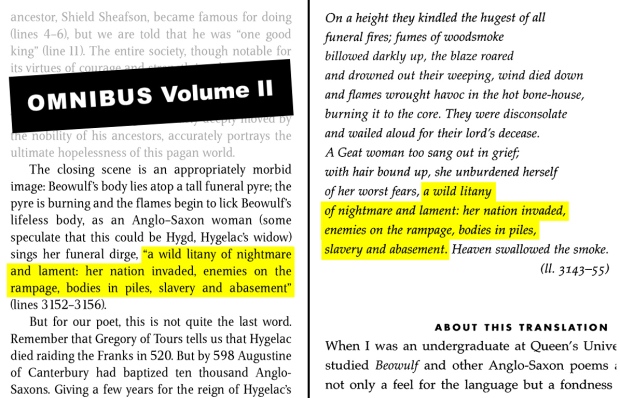









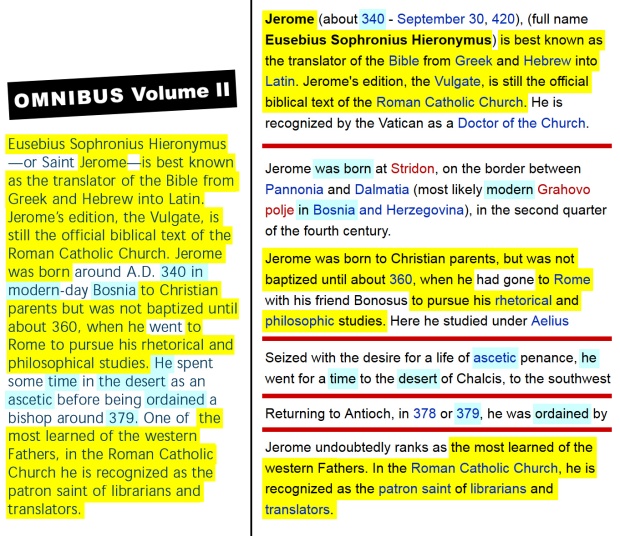
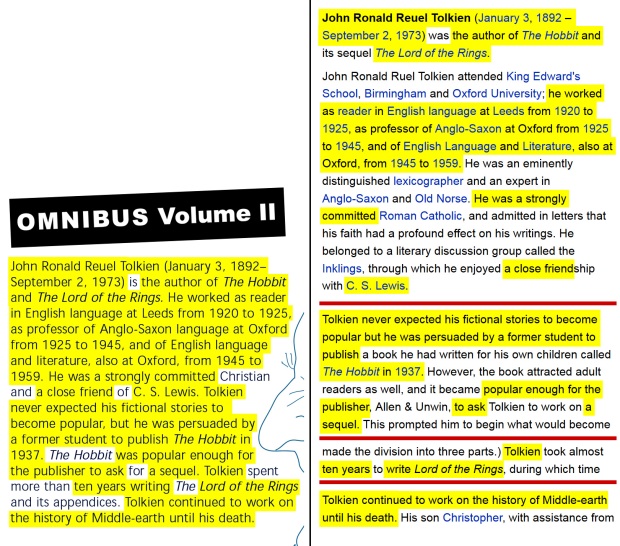

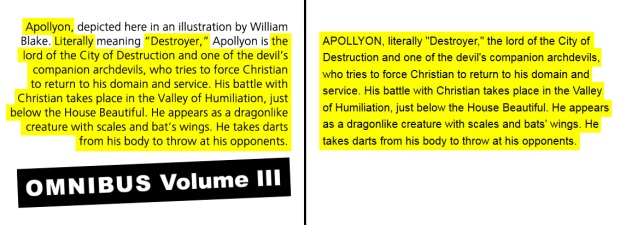
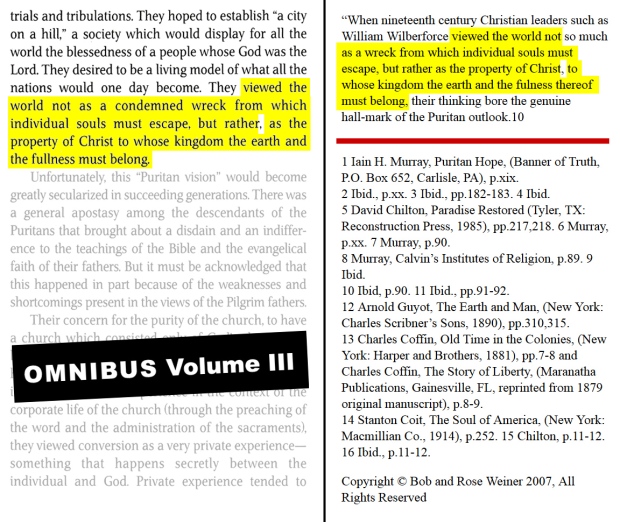










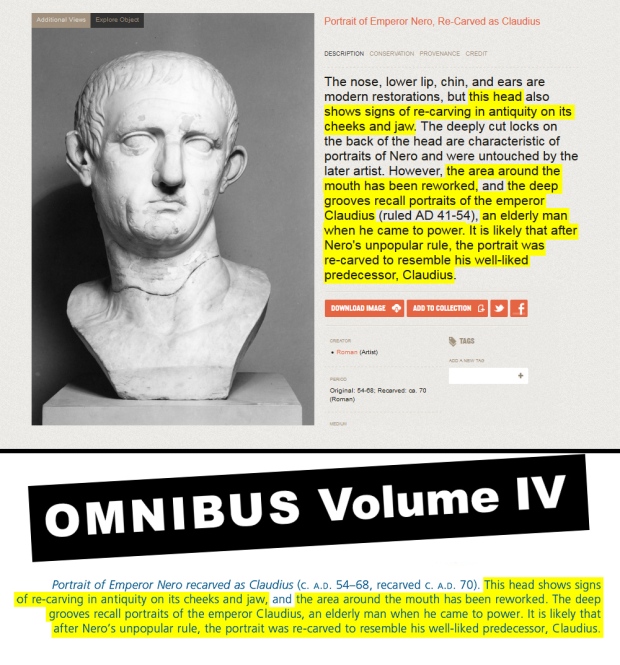
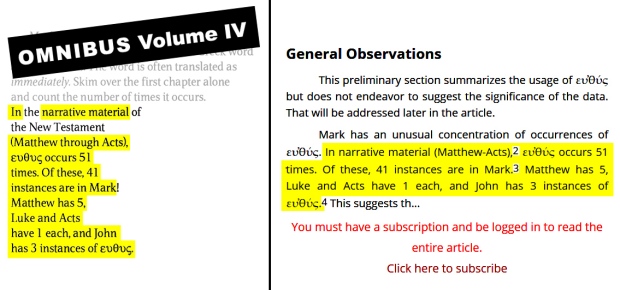





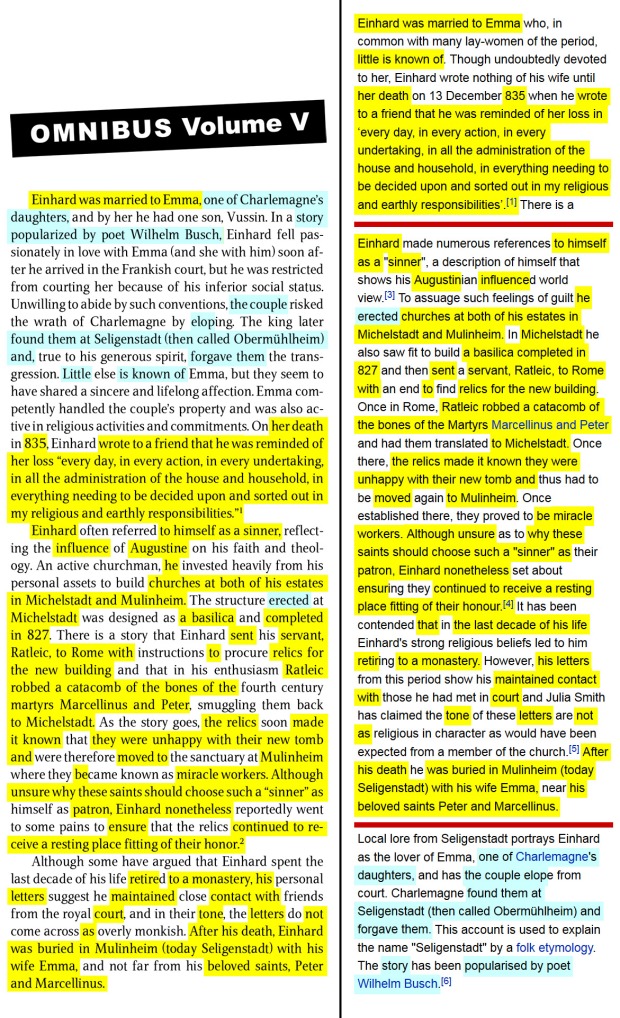




















I was alerted to this post by The Truth About Moscow blog. I got into your first paragraph and the theme from “Jaws” started going through my head…
I’m not sure which is funnier : that copyright infringement notice right after Moondrunk, or that second quote from the top that has the explicit plagiarism warning to students.
LikeLike
Rachel, the countless hours of research and related work you have done to amass the material, is almost unimaginable. – God bless you for speaking truth to power and helping others to open their eyes to the danger, indeed, the spiritual malignancy, of those who contributed to and edited the Omnibus volumes.
Rose Huskey
LikeLike
“oly cat bird batman!
LikeLike
I note that almost (though not all) of these examples are from sidebars (textual inserts) and from image captions. It should be pointed out that the author of a particular essay did not write the sidebars or the image captions that Veritas inserted to go along with that essay.
For example, Peter Leithart wrote an essay for Omnibus on *The Great Gatsby*. He did not include the picture of a Duesenberg car or write up a caption for that picture, nor did he write a sidebar with definitions of slang from the Gatsby era. Those things were inserted by someone else in the process of producing the volume.
The responsibility for the sidebars, textual inserts, and image captions rests with the publisher and editors.
LikeLike
I made a note to that effect.
LikeLike
Thanks!
It’s probably just me, but … I’m not seeing the note. It might be helpful to put it in bold or italics or something, so that readers know you’re not saying that the essay authors (e.g., Leithart) are responsible for something that someone at Veritas put in alongside their essays.
LikeLike
I said that I included the authors’ names for citation and that I didn’t know who was responsible for the plagiarism.
LikeLike
But I will make a note that is clearer
LikeLike
Thank you!
LikeLike
I used to use a software like this in teaching (turnitin.com). Great stuff.
Normally, I would say, “See the evidence right there? You can’t deny at this point.” But I’ve learned otherwise.
LikeLike
Thanks for your hard work on this. The whole mess has been a real education for me, I even attribute my own Bible study notes now in case I ever want to publish something.
LikeLike
Speaking as an actual academic*, this review does not merely devastate Douglas Wilson’s claim to scholarly credibility; it annihilates it. The level of plagiarism here is egregious. A single one—any one— of these occurrences in a published book or article would be sufficient to ruin the reputation of a legitimate career scholar. Heck, any college freshman should know better. No professor who saw this kind of dishonesty in student work would accept the excuse that this was accidental or that they didn’t know it was wrong.
Adding insult to injury is the fact that many of these plagiarisms are quotes taken from online sources including none other than Wikipedia. This means that you can quite literally get more reliable information from Wikipedia than you can from the book Mr. Wilson edited. In at least one case, the editors even introduced a spelling error (“Ninevah”) into their plagiarized quote!
Faced with this evidence, the Christian Classical Education movement as a whole either has to immediately dissociate itself from Mr. Wilson and his colleagues, or concede that they have less regard for intellectual standards than the administrators at any community college in the nation.
I wonder, how many more of Mr. Wilson’s logorrheic books contain plagiarism? This pattern can no longer be deflected as coincidence.
* (A current graduate assistant, but in order to get my lowly job you need more education than Mr. Wilson has. That should tell you something, too.)
LikeLike
I notice there is always another name besides Wilson on each of the books. Plausible deniability? All he has to do is get his co-editors to take full blame, as in previous incidents, and he will claim to be off the hook.
What does it take to establish this pattern as more than coincidence? And if Wilson were to ask anyone to co-author or co-edit anything, they would do best to turn and flee.
LikeLike
> “I notice there is always another name besides Wilson on each of the books….”
Yes, but at this point the pattern to notice is that the name Wilson is on each of the books. The others are not. This is precisely the kind of pattern that can’t reasonably be attributed to coincidence. Are we really expected to suppose that several co-authors, each independent of the others, coincidentally happened to think, “Hey, I’m working with Douglas Wilson; maybe I should plagiarize something”?
“Fool me once, shame on you. Fool me twice, shame on me. Fool me three times, statistically significant.” —https://twitter.com/academicssay/status/661518236177952768
That said, it would perhaps be shrewd of Rachel to do some plagiarism analysis on some of Wilson’s solo-authored books if she wanted to put that canard to rest with the others.
LikeLike
Interestingly, Wilson wrote a blog post in which he discusses a scenario like the one that seems to have transpired here: https://dougwils.com/s7-engaging-the-culture/110195.html
“…his sin would be the sin of lying — seeking to create the impression that he is cleverer than he actually is. He is implicitly telling the congregation “I did the work necessary for this sermon,” when in fact he did not do that work. If he is stealing, he is stealing an intangible thing, something like honor. […]
“When a man includes in his sermon the fact that “Cambyses II reigned from 530 to 522,” and he only knows this because he looked it up during sermon prep, and he is going to forget it as rapidly as everybody else will, he is also creating the impression that he is more clever than he is. […]
“But make no mistake — if we are pursuing scrupulous honesty, we will get to a point where this issue is not complicated at all. […]
“A small industry (dictionaries, encyclopedias, etc.) is dedicated to the hope that people will look up and use the information found in them. The expectation is that they will not lift the definition verbatim in order to pass it off as something of their own devising….”
(Incidentally, in Wilson’s hypothetical example sentences about Cambyses II in the post, the answer is indeed ‘not complicated at all’: They are all strictly plagiarism since none of them cite where they got their information.)
LikeLike
Rachel, thank you for your work on this subject. debunking the mythology that characters like Wilson have cultivated about themselves will reap untold benefits.
LikeLike
Thank you, John Barach, for the clarification. And thank you, Rachel, for your research. I am sure that just like last time when you found Wilson and Booth had plagiarized the “Justice Primer,” Wilson will once again be eternally grateful… Until he spins it and attacks you. Again.
So is it only the students at the Wilson schools who are held to the higher standard of not plagiarizing? Is it only the students who have to leave the school, tail between their legs, for plagiarism? I wait breathlessly for the spin that will be forthcoming.
LikeLike
I’m thankful that you and others are exposing these leaders. One after another has gone down recently. The movement has devastated so many people. I think this is because the authority figures apply rules like band-aides to our larger secular culture, rather than the practices springing naturally from the culture. We don’t have the traditions any longer to support them. I hope that makes sense. I’m so tired right now. There is nothing wrong with classical education or courtship rituals, for example, except that they are open to abuse because they aren’t woven into the fabric of our culture; nobody knows much about them outside of theoretical frameworks. This leaves little room for accountability and allows the practices to be misused by patriarchs who claim to be authorities or experts. The weak are exploited and preyed upon. And everybody else flounders.
LikeLike
“except that they are open to abuse because they aren’t woven into the fabric of our culture; nobody knows much about them outside of theoretical frameworks”
I think this is slightly naïve. Yes, traditional frameworks do have some regulatory aspects that can deal with the most egregious abuses – quite often ones that occurred in the past – but still have plenty of scope for the charismatic and powerful to get their own way within those frameworks – often via creative re-interpretation.
LikeLike
I wish were surprising.
LikeLike
Far be it from me to defend Wilson on this matter, because it’s pretty apparent that there’s some plagiarism going on here.
However, if I may, a lot of this looks like the standard paraphrasing that one would find in summarizing these topics, because there are only so many ways to write a sentence about a topic. Also, I’m not entirely sure if the “Beowulf” example counts as plagiarism, seeing as it’s in quotes with a line citation. Maybe my citation-fu is not up to snuff, and if so please correct me, but given the degree to which Wilson’s fans are willing to laager up around Moscow, putting anything forward as part of the evidence that is not incontrovertably plagiarism is a bad idea.
But even with all that having been said, this is still very bad for Wilson.
LikeLike
Quoting from a translation without giving credit is still plagiarism
LikeLike
From my article on the definition of plagiarism: One final type of plagiarism that I want to consider today is Uncited Quotation. The Harvard article defines it this way:
“When you put source material in quotation marks in your essay, you are telling your reader that you have drawn that material from somewhere else. But it’s not enough to indicate that the material in quotation marks is not the product of your own thinking or experimentation: You must also credit the author of that material and provide a trail for your reader to follow back to the original document.”
LikeLike
Link to the Harvard article: http://wp.me/p1YwlL-pl
LikeLike
Alright then, question answered.
Wilson, Wilson, Wilson, when will you learn?
LikeLike
> “…there are only so many ways to write a sentence about a topic.”
If an editor can’t easily think of six different ways to word any particular sentence, he shouldn’t bill himself as a “wordsmith.”
Any self-described “wordsmith” should quickly be able to come up with several unique ways to write about anything.
Rephrasing sentences shouldn’t be hard for anyone who claims a reputation in “wordsmithy.”
Anybody who lacks the skill to rewrite any given sentence in any number of ways is no “wordsmith.”
Rewording a sentence in half a dozen original forms should be a basic exercise for everyone who aspires to be a “wordsmith.”
The whole point of being a “wordsmith” is the ability to express a given thought fluently, in as many ways as you choose.
Shall I go on? 😉
LikeLike
Exactly. It’s a lesson on researching that you teach to middle school kids.
LikeLike
I can’t wait to see Wilson try to call you out again for calling him out on plagiarism. I really begun to suspect he was mentally ill at that point.
LikeLike
If you do hear from Wilson, let us know, will you?
LikeLike
Do you think you should credit John William Waterhouse for your use of his art in your blog?
https://en.wikipedia.org/wiki/Miranda_(The_Tempest)
LikeLike
I did credit him: http://wp.me/p1YwlL-si
LikeLike
Guest,
Please be aware that Waterhouse’s painting in this case is in the public domain. So while Miller’s crediting is laudable, it is not legally required.
I must ask: were you aware of the concept of public domain before posting this? If so, why would you comment thusly? If not, I hope this new knowledge helps you in understanding the nature of ethical use of previous works.
LikeLike
Ah, so you did – sorry. Nice parable!
Thanks, and keep up the good work.
LikeLike
My wife and I were at the HEAV conference in Richmond, VA this past weekend. Veritas Press was there with Omnibus on prominent display. The presentation was compelling: The textbooks were on the top two rows of a display rack, all of the great books were arranged below: The Code of Hammurabi, The Iliad, etc. The textbooks are gorgeous. Full color. Lots of classical artwork. Veritas has a set of Omnibus-based online classes. Very slick and tempting.
Then I noticed Doug Wilson’s name and alarm bells went off. I don’t follow him closely, but some other blog I’ve read have mentioned his views on slavery and patriarchal bent. A quick Google-search and I found your posts. Wow! Bullet dodged. Beyond the plagiarism issue is the lack of qualifications of those writing the essays. Unbelievable. Amazingly, none of the reviews I found mentioned this huge lack of credentials of the writers.
Thank you for your work uncovering this fraud.
LikeLike
They’re still promoting the Omnibus series? As recently as this month? I get that they might be reluctant to make an official statement about the plagiarism findings, but to press on displaying the books is unbelievably brazen. Very deceptive; so much for “Veritas”.
LikeLike
VP will never make a public statement. They will simply ignore it, thinking it will go away with minimal number of people finding out. They are only concerned about selling it, with little concern for the integrity of the work.
LikeLike
Good work here. As a classicist, I wrote a chapter for the Omnibus text on Plutarch’s Lives before leaving Veritas Press/Academy. I don’t believe anyone with any background in Classics was involved in the project other than me, so I’m not surprised to learn of the plagiarism.
LikeLike